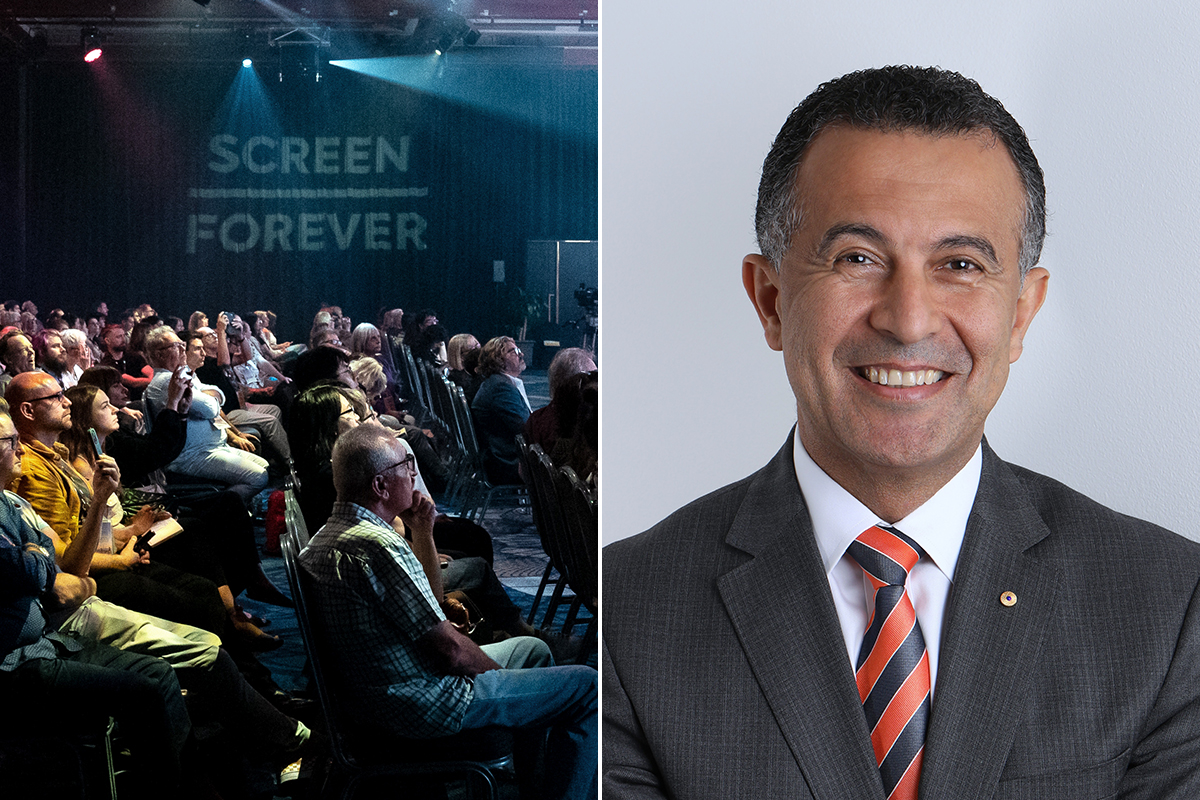In his keynote address at this year’s Screen Forever Conference, Michael Ebeid AM, Chair of Screen Australia, laid out a new roadmap for the organisation.
With the intent of ‘future-proofing’ the nation’s screen sector, Ebeid addressed an audience of industry leaders, talking through the rapid transformation of the Australian screen landscape and unveiling a new strategic framework designed to steer the industry through disruption.
‘I believe our industry has seen more change in the last five years than possibly in the last 50,’ Ebeid said. ‘From how content is made to how it’s funded, discovered, watched and played – the transformation has been profound.’
Screen Australia’s new purpose and five strategic pillars
Central to Ebeid’s presentation was the announcement of Screen Australia’s new organisational purpose: ‘to help build a vibrant and viable screen industry that reflects the depth and diversity of Australia’s stories‘.
This vision will be driven by five strategic pillars: Empower, Enrich, Enable, Engage and Elevate.
‘It’s not about how many initiatives or projects we support, but about whether we’re achieving our purpose and have impact,’ Ebeid said.
Empower broadly encompasses Screen Australia’s industry insights and resources, including updated reports on audience trends, production infrastructure, and the economic value of the screen sector. ‘We want to be the source of truth for insights, market intelligence and relevant reporting,’ Ebeid said, noting a forthcoming revamped website to better support practitioners.
Enrich translates to strengthening the financial sustainability of production companies and professionals through business development, talent programs and tools for accessing private investment. ‘We will look to extend support beyond individual projects,’ he said.
Enable focuses on getting more Australian stories on screens by simplifying funding processes and supporting innovative approaches to production, distribution and financing. As part of this, updated Narrative Content and Documentary guidelines were announced.
‘We’re moving to a platform-agnostic approach to development and production funding – backing the best ideas regardless of format or platform, which will see more “digital-first” productions in line with where audiences are,’ said Ebeid.
Engage, a direct response to the ‘rapidly evolving’ viewing habits of audiences, will be underpinned by two measurable outcomes: increasing both the proportion of Australians who value local content and those who are aware of it.
To action these outcomes, audience testing will be introduced by Screen Australia at the development stage for film projects, and funded teams will be expected to supply data on reach and engagement to help shape future decisions.
Lastly, Elevate means reaffirming Screen Australia’s global ambitions, with Ebeid announcing a ‘more targeted’ international strategy to support co-productions, market attendance, and international promotion of local games and content.
‘We will continue to elevate our independent games industry on the global stage, to help them earn the international recognition they deserve,’ said Ebeid.
Screen Australia responds to industry challenges
Ebeid was frank about the economic and structural pressures facing the sector. ‘In 2023/24 we were only able to fund 30% of applications, and for this year it is tracking at 27%,’ he said, noting rising production costs and a surge in demand for funding. Still, he pointed to growing government support – with combined rebates and state funding reaching $1.2 billion – as evidence of the industry’s underlying strength.
‘These are concrete numbers that show the underlying strength of our industry, albeit experiencing some growing pains from the shifts I outlined earlier that require transformation.’
He acknowledged industry feedback gathered through a recent survey, which found less than a third of creatives feel confident in understanding industry trends, and more than half are concerned about AI’s impact.
‘Your feedback was clear: our application process was overly complex, our resources too thinly spread, and we needed to become more future-focused and transparent – in short, be more relevant, sustainable and impactful.’
ScreenHub: Generative AI use won’t stop films from winning an Oscar – but it won’t help them either
A screen sector already in motion
Screen Australia has already begun implementing major changes in line with this strategy. Offset appeals have been cut by 90%, and a dedicated Head of Games, Joey Egger, has been appointed. The agency also created a new advisory role to support Offset and Co-production applications, with Michele McDonald stepping into the role.
‘We’ve hit the ground running, but this is just the beginning of what we aim to achieve together,’ Ebeid said.
Ebeid closed his keynote with a call for collective action and boldness in the face of change.
‘The greatest danger in times of turbulence is not the turbulence itself, but to act with yesterday’s logic,’ he said.
‘Together, I believe we can create the future of Australia’s screen industry – not just adapt to it. We just have to be brave enough to let go of the old models that we know are broken or challenged.’
With a future-focused strategy and a renewed sense of purpose, Screen Australia appears set on leading the sector into its next chapter.





